Whether they’re operating quietly behind the scenes or joining athletes on the podium, the Chef d’Equipe is a vital part of every national equestrian team. If you’ve ever wondered exactly what a Chef d’Equipe does, keep reading. You’ll learn about their many duties as well as the challenges they face throughout any given year of competition…
What are the Responsibilities of the Chef d’Equipe?
The Chef d’Equipe is the leader for a national equestrian team, although that makes the job sound simple.
In reality, the Chef d’Equipe wears many hats and takes on a wide variety of responsibilities, including:
- Selecting athletes for teams
- Developing strategies for events
- Providing technical coaching
- Offering mentorship and encouragement
- Assisting with team logistics
- Helping teams advance to key competitions
- Serving as a media liaison
In many cases, their main job is to handle as much as possible, so the athletes can focus on performance.
The duties of the Chef d’Equipe may also depend on the nation they represent and the riding discipline in question. For instance, in team Jumping, the leader must decide the order of athletes and who will fill the anchor position when the pressure is on at the end of a competition. They also choose which athlete will ride in a jump off.
How Are Chefs d’Equipe Chosen?
Typically, national federations issue requests for CVs when seeking a new Chef d’Equipe. However, sometimes they have someone who has expressed interest or has been recommended. A committee then reviews the information and selects whom they believe is the best person for the job.
Chefs d’Equipe have nearly always been high-level competitors in their own right and may even have been champions in the past. They’re often retired from competitive riding but still have an interest in the sport and much to offer in the way of elite coaching and inspiration. US Jumping Chef d'Equipe Robert Ridland (pictured above), a former Olympian himself, has enjoyed great success since assuming the role more than a decade ago.
What do federations look for in an ideal Chef d’Equipe?
- A high level of experience in the discipline
- Familiarity with major competitions and FEI rules
- Ability to handle pressure with grace
- Sound judgement and discretion
- Good communication and mentoring skills
- International connections and networking
- Solid organising and record keeping
Of course, it’s essential that a Chef d’Equipe does not have any conflicts of interest. That said, you’ll find many Chefs d’Equipe coaching teams from countries different to their nation of origin.
What Are the Greatest Challenges for a Chef d’Equipe?
The schedule of a Chef d’Equipe is a busy one, especially in a year like this, where there have been so many Olympic qualifying events. Most coaches are on the road about 50 per cent of the time and back at home during the rest of each month.
Fortunately, another challenge has been made easier by technology, and that’s keeping up with the top athletes for the nation. Now Chefs d’Equipe can watch shows online when they’re not there to see them in person. They’ll chat with athletes and analyse their performances, helping them improve for the next competition or perhaps partner with a different horse if one is struggling to keep up.
Selecting athletes for important competitions can be challenging. For top-level events, like the Olympics, Chefs d’Equipe work with a national committee to get consensus on who to choose.
Sometimes, picking one athlete over another, such as for a jump off, can lead to internal conflict. For this reason, a Chef d’Equipe must also be a calm negotiator. Many say they particularly choose athletes for their teams who don’t get into ego-driven arguments, so this situation can be avoided from the start.
When you see a new face in an FEI competition, it’s often the result of a Chef d’Equipe working to bring up young athletes or invite those who have been out for a spell back into the fold. Not only do Chefs d’Equipe constantly watch the best of their country, they also keep an eye on budding talent, so they always have a funnel of athletes for team depth.
After guiding their teams as this year’s various European Championships, Nations Cups, Pan American Games and Asian Games, 2024 won’t offer any respite. Chefs d’Equipe are already making plans for next year’s Olympic Games when they hope to guide their teams to glory.
Source: FEI



